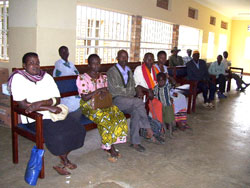Our work with HIV/AIDS
HIV Clinic
The clinic was set up by the JCRC and is run by a doctor and a laboratory technologist, with the help of other hospital medical staff, including clinical officers, nurses, a dispenser and counselors. The work is supported by visits from the Elizabeth Glaser Aids Foundation, a community based project. Both JCRC and Ministry of Health clients are cared for, with about 220 currently on ART and about 500 on general care.
Adherence
The clinic initially enjoyed an adherence of over 95% for all clients. But recent data has showed a marked drop. Adherence can be affected by the following factors:
Travel
Patients have to travel very long distances to get to the clinic. This is not only time consuming, but expensive, with transport costs worsening recently due to problems with fuel supply.
Diet
Some people who are poor choose not to take the drugs, because they make them weak. Many appreciated food supplements, received last year, but a continued supply is needed. Opportunistic infection drugs (OI drugs) eg. Septrin, Iron tabs, multivitamin vitamins, amoxicillin and ciprofloxacin, are used, but stocks sometimes run out.
Lack of local community support groups
Some areas are supported by Compassion International (e.g projects at Kaswa and Burunga). Patients receive home-based care, refunds of transport costs (to and from the clinic), and hospital bills (for those that are admitted). Unfortunately, the worse hit areas are very far from such support.
Challenges of HIV/AIDS work:
Clinic outreach

The clinic would like to devote at least two days or more per month to go to outlying places, to reduce the number of people who drop out of the programme. This would require:
Provision of a vehicle and fuel
Allowances for the driver, counselor, clinician and dispenser
Additional O.I. drugs (that would otherwise only be available if client was at the hospital)
Radio announcements to advertise the service
At least another two computers for the clinic or hospital
We are also in anticipation of the promised electrolyte machine for RFTs and LFTs
If you would like to help the HIV clinic to meet this challenge, we would love to hear from you.
 RUSHERE COMMUNITY HOSPITAL
RUSHERE COMMUNITY HOSPITAL